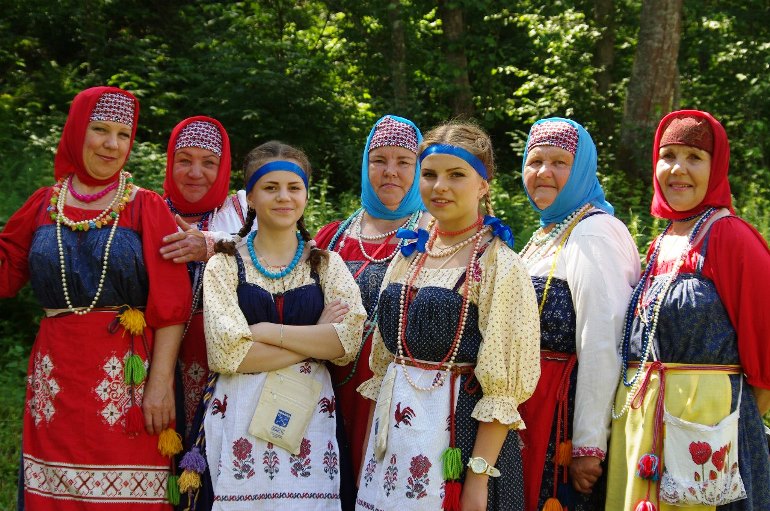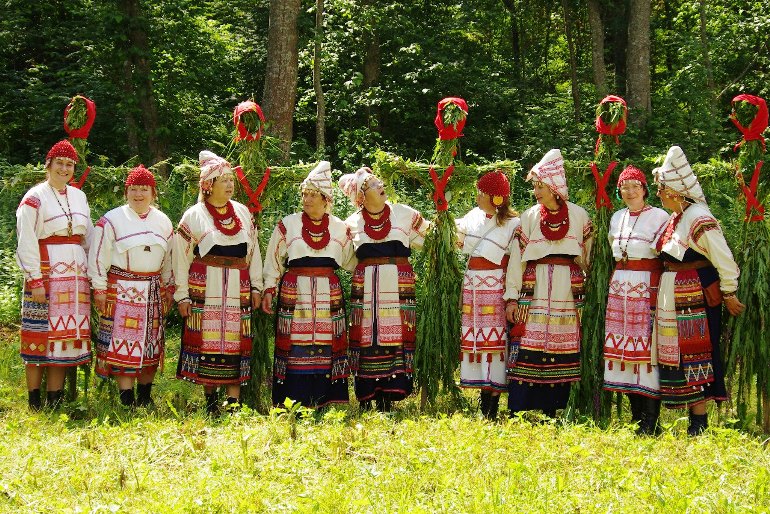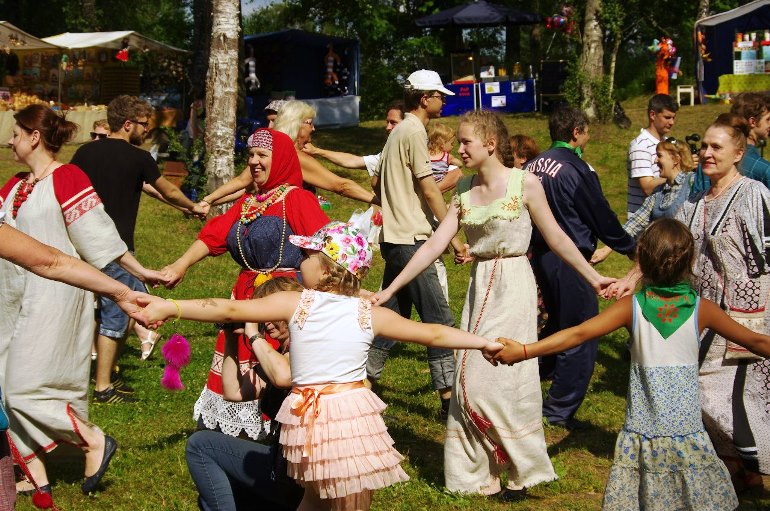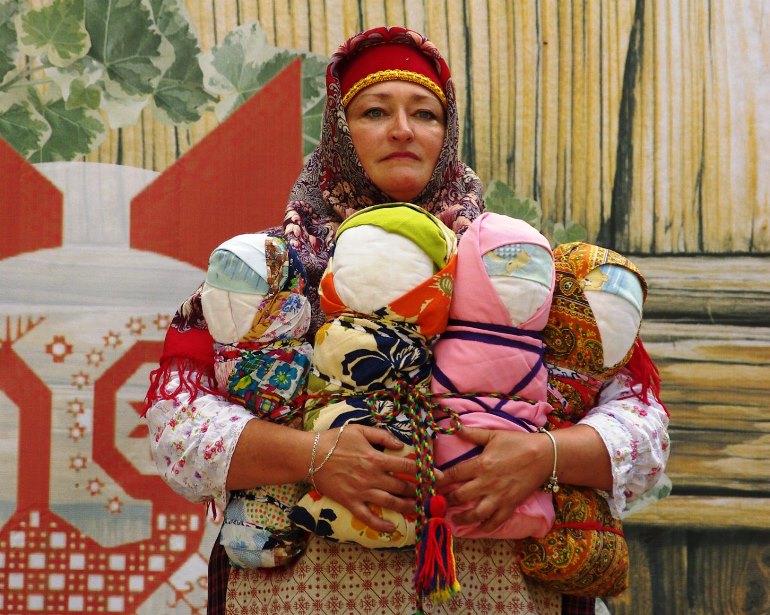Sergey Vinogradov
Photo by Yulia Naumova
The International Year of Indigenous Languages declared by the United Nations has come at the rather favorable for the Veps language period. Scholars studying it, as well as Vepsian writers and journalists have in unison proclaimed this time to be its renaissance. In the 1990s there was a boon accompanied by financial and administrative investments; and its benefits cannot be underestimated: dictionaries and text books have been published, Vepsian cultural centers and classes have been opened, newspapers, web-sites and TV channels have been operating in the Veps language. And just as important is the fact that young people come to learn the Veps language, including Russian youth.
In recent years the Veps language has become the language of international communication. Its studies have brought together professionals and enthusiasts from Russia, Finland and the Baltic states. International conferences are held, grants from European foundations for studies of the Vepsian language are allocated, and foreign scholars make language ethnographic expeditions to Russian villages. And nobody speaks about “sanctions” or “annexations” here - there are simply no such words in Vepsian language.
Vepsian language shall be preserved and evolved
The Veps is a Northern nation related the Finns and the Karelians. Most Veps live today in the north-west of Russia - in the Leningrad and Vologda regions, as well as in Karelia. The Veps can also be found in the Irkutsk and Kemerovo regions - their mass migration to Siberia took place at the time of Stolypin. According to the census, about 6,000 Veps live in Russia. Almost all of them are bilingual, but in many cases the Vepsian remains to be a language of childhood and grandmother’s fairy tales - they do understand it, though not use in everyday life.
The Russkiy Mir had a chair with Nina Zaitseva, DLitt, the most competent specialist in this field and the creator of the Vepsian literary language, to talk on why and who needs researches on the Veps language today. She has published 15 textbooks on Vepsian language and is the author of Virantanaz, a Vepsian epos, in which folklore themes are interlaced with dialogues, songs, funeral and wedding weeping. Nina Zaitseva heads the linguistics department at the Institute of Language, Literature and History of the Karelian Research Center of the Russian Academy of Sciences
Nina Zaitseva. Photo by Yulia Naumova
- Who needs our researches? Science does; we are scholars at the first place, she says. Science cannot stand still and must develop. But when scientific work coincides with the period of the language revival, then knowledge can also be used in practice. Science explores everything that surrounds us, each and every kind of plant and insect. You can ask the same question - why, why, who needs it?
– You said that the current period was revival of the Veps language …
– Certainly, everything is evolving. You know, when in 1989 I was approached with a request to translate something from the Bible into the Veps language, doubts arose despite the fact that I was Veps with absolute knowledge of the language. And now I can say with confidence that I am capable to deliver any philological lecture in Vepsian language, as well as to speak on any topic of a universal nature. Physics, chemistry or, figuratively speaking, rocket science are not yet available in Vepsian. The Veps language has been evolving through contribution of scholars, teaching at school, publishing textbooks, and so on.
– To which degree is the Veps language developed in social interaction today?
– It is hard to say. Language preservation responsibility lies with a family; however families with Veps are often mixed. I will say even more - today, probably, there is no any monoethnic Veps family. I am glad that parents, who are ancestral Veps and often do not speak the language themselves, send their children to learn Vepsian. I also want to say that there is a Veps intelligentsia that lives in Petrozavodsk and other cities. These people work in newspapers, on radio and television, make films and do a lot to make Vepsian language be heard. There is a special club where we can come and talk in Vepsian.
– How closely do you associate with scholars from Finland?
– No doubts, we communicate closely. There is a professor in Finland who is actively engaged in studies of Vepsian language; he also teaches it to students. I went there myself to lecture on Vepsian language and literature. Furthermore, there is a foundation in Finland that allocates grants, including those for studies of the Veps language.
– Knowing Vepsian, can you talk to contemporary Finns without an interpreter?
– Languages are very similar, especially their base. According to some linguistic laws, final vowels have been removed in Vepsian. For example, a forest in Finnish is “metsya”, but in Vepsian it is “mets”. When I figured out these rules as a linguist, everything became easy for me. However, at first I used to confuse Finnish and Vepsian words, and the Finns said that I spoke an ancestral language, because Vepsian is more ancient. Some time ago they even called it Baltic-Finnish Sanskrit.
Crow, Crow, What Do You Need?
Vepsian writers and poets, who the Russkiy Mir reporter managed to talk to, shared that creativity for them was not just realization of personal potential, but an actual life mission. And in many instances they took up the pen to replenish the Vepsian bookshelf. They write about ancient times and mythological heroes, as well as about the present day.
Photo by Yulia Naumova
Olga Zhukova is a teacher, a scholar and a children's writer from Petrozavodsk. "I was born in the Veps family in the Leningrad Region, she said. I spent most of childhood with my grandmother and grandfather; they talked to each other in Vepsian and with their children - in Russian. My knowledge of the language was passive - I understood everything, but I spoke very little. When revival of the language began and my school introduced Vepsian lessons as the optional ones, I started attending them."
Sometimes in the evenings, little Olya asked her great-grandmother to tell a Vepsian tale. Some of those tales that she listened before going to bed were included into the Vepsian folklore collection, compiled by Olga Zhukova, now a professional graduate. “I sometimes call my grandmother and mom to clarify how a particular Vepsian word is pronounced,” says Olga. “Would I want my children to speak Vepsian? Probably yes. In the morning I dress up my little son and tell him in Vepsian: “Lift up your leg, give me a hat.” He understands. I know that a child should be talked to in Vepsian language from an early age, and I try to do it, but I can't keep up and mix languages.”
Olga Zhukova has been writing poems since school. Back then they were given a task to think up a poem or a fairy tale. So she came up with a song, and it was so successful that her song was published in a Finnish magazine. And children in kindergartens have been learning and singing it.
“I have been writing since then, says Olga. Not because I am a real poet and lyrics flows through me, but because there is no much children literature in Veps language. Some magazines have been opened; and they ask me to write. I agree because understand that it is necessary.”
Several books with Olga Zhukova’s works of authorship have been published. There are also collections of fairy tales, lullabies and counting rhyme, which she collected and processed. They are bought at no time and used in study groups and kindergartens.
Photo by Yulia Naumova
“Sometimes I take a folk phrase and complete it to make a full poem,” says Olga. “Suppose, there is a saying: “Crow, crow, what do you need?” It is rhymed in Vepsian. I have heard this saying since my childhood. It can be easily memorized. I completed it to make a poem - What does a crow need? So the crow tells that it needs to eat, drink, find her nest and know everything in the world.”
Olga teaches the Veps language to students. According to her, previously a student could be accepted to the Baltic-Finnish Philology Department of the Petrozavodsk University only after an interview, provided that he/she knew Vepsian. Nowadays there is no such precondition. A lot of young people, who are not related to the Veps, come to study; they are interested in the culture of this nation. “The background encourages language learning, it is a good motivation,” says Olga Zhukova. “But background is not a prerequisite. I taught a girl from the Murmansk region. She is from a Russian family and studied for 5 years; and now she is going to a Vepsian village to teach Vepsian at school.”
Remarkable people and Vepsian cuisine
"The Veps language is my mother tongue since I was born in a Vepsian village and grew up in a family where everyone spoke it, Valentina Lebedeva, a writer and a poet, shared with the Russkiy Mir. I was blessed with my mom and grandmother who loved to answer my questions helping me to discover miraculous world with believes in spirits and power of spells. During long winter evenings neighbors used to come to our house for conversation. I was astonished by their stories of house and forest spirits, noids (wizards), and memorized many wonderful tales. I have been writing short poems and songs since my early youth. I have never wanted to write poems in Russian: even if I did, I had to grind them out of myself with a great effort, but poems in my mother tongue suddenly pop out and words come all by themselves."
Photo by Yulia Naumova
Valentina managed to dedicate her time to creativity in a proper way only after retirement. She settled in a village and began to write short stories about everyday scenes of village life; her characters are real people from the past and the present. “I must say that it is much harder to write prose than poetry – you really need perseverance and good knowledge of languages, local traditions and village charm, she shares. I did not follow any literary standards and rules in attempt to show true nature of the characters; I used Vepsian vocabulary known to me; it doesn’t have many adjectives, but there are a lot of verbs with various nuances of action, behavior.”
Remarkable people, a book with her stories, poems, and collected folklore literature, was published in 2015. The book was of great success. The Veps, as well as the Russians were inspired to read it. Then the other books were published, including those dedicated to Vepsian cuisine.
“What is required for preservation and evolution of the Veps language? There must be a developed village where people could be born, study, and work, preserving behaviors, traditions and system of believes, that have been historically inherent to our people,” believes the writer.











